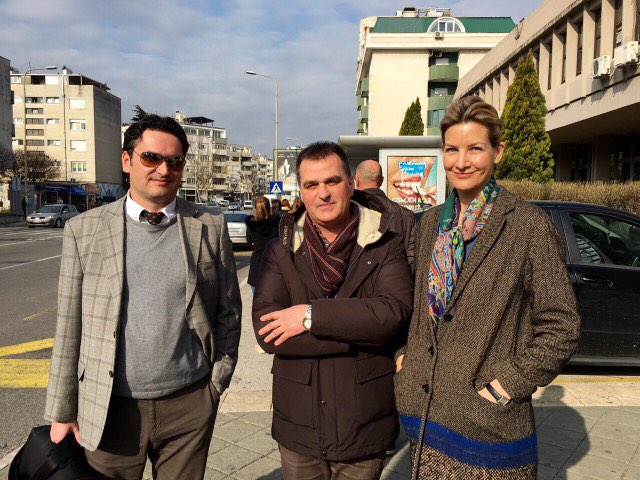
25/6/2018 AT CONCLUSION OF THE PUBLIC DEBATE ON THE DRAFT LAW ON THE SAME SEX LIFE PARTNERSHIP
27/06/2018
10/7/2018 APPEAL COURT INCREASES DAMAGES AWARD TO JOURNALIST FOLLOWING FAILURE OF MONTENEGRIN AUTHORITIES TO INVESTIGATE ATTACKS AGAINST HIM
10/07/20181/7/2018 Gorjanc Prelević: Urgently elect four members of the Judicial Council

Photo: Boris Pejović
(HRA executive director Tea Gorjanc Prelević’s interview by MINA news agency, 1/7/2018)
The finally adopted legal solution on the Judicial Council, based on the recommendation of the Venice Commission, extends the mandate only to members of the Council from among eminent lawyers.
Members of Parliament should urgently elect four new members of the Judicial Council from among eminent lawyers and prevent the extension of mandate of previous members for an indefinite period, said the executive director of Human Rights Action (HRA), Tea Gorjanc Prelević.
She recalled that the Judicial Council mandate expires tomorrow (2 July) and that vote on new members from among eminent lawyers has not yet been scheduled for unknown reasons and that the mandate of the previous members will therefore be extended.
Gorjanc Prelević believes that the competent parliamentary committee, in cooperation with the opposition in the Parliament, should urgently elect four candidates from the pool of candidates and send the proposal to the parliament for voting, in order to, as she said, give chance to the new composition of the Council to perform better than the previous one as soon as possible.
“The appointment of new members of the Judicial Council from among eminent lawyers should be urgent and so the previous members should not be continuing their mandate, as provided by the recent amendment to the Law on Judicial Council”, said Gorjanc Prelević to the MINA agency.
She recalled that the legal decision on the Judicial Council which was adopted according to the recommendation of the Venice Commission, does not extend the mandate of the Judicial Council as such, but only to its members from among eminent lawyers.
As the executive director of HRA stated, the Venice Commission considered that this was a necessary solution for the judiciary to function normally because it was informed that in the conditions of the boycott it was certain that the opposition deputies would not allow the election of members of the Council.
“It is a compromise solution that ensures the Judicial Council continues to work, the only question is whether the adoption of this law was really necessary and why until the very end of the mandate of the Council, meaning tomorrow (2 July), it has not first been seriously attempted to select the remaining members,” said Gorjanc Prelević.
She said that this indicates that no one feels any need to hurry about it anymore, and that it would be enough to extend the mandate of the former members indefinitely, which, she believes, would be an unfavorable and retrograde solution.
“I think it is indeed necessary to ensure continuous work of the Judicial Council and the judiciary, but before the adoption of this breakneck law it should have been attempted more seriously to ensure election of members of the Council in the Parliament by the necessary two-thirds or a three-fifths majority, and if that fails then pass a law,” said Gorjanc Prelević.
She recalled that at the end of her opinion on the draft law, the Venice Commission also expressed hope that the new members of the Council would be elected and that the extension of the mandate of the former members will not be necessary.
Gorjanc Prelević explained that the competent parliamentary committee first decides on four candidates for membership in the Council, and only after that the Parliament votes on them.
She believes that, although the opposition boycotted the Parliament since the elections and there are yet no members in the parliamentary committees, an agreement with the opposition parties who have returned to the Parliament could have been attempted on four Council members who would be able to get the required majority on the first or second vote.
“However, it has not yet been announced that the committee tried anything like that while the mandate of the Council expires tomorrow. According to the statements of the opposition MPs during the discussion on the Law, nobody asked them anything,” added Gorjanc Prelević.
She believes the government and the opposition should be able to agree on the choice of the former judge of the European Court of Human Rights in Strasbourg, Nebojša Vučinić, and that everyone could immediately agree on that candidate at least.
“His presence in the Judicial Council would, I believe, greatly contribute to improving the confidence in the Council and the judiciary as a whole,” said Gorjanc Prelević.
Commenting on the four-year work of the current composition of the Judicial Council, Gorjanc Prelević said that in the challenging situations this body was favorable to the executive authorities and to that end even made up some rules.
“I think especially of the cases when the Council refused to consider the bias of a judge who concluded in the judgment that it was impossible for a Montenegrin state official to act immorally, or when the assistant minister in the competition for the post of a president of court was provided more points than the judges who also ran for the position, although that was not possible according to regulations”, HRA executive director said.
She added that this convocation of the Council will also be remembered by the fact that it, without explanation, often elected candidates who did not get the highest number of points, but were even the 17th and 18th on the list, did not improve the work of the Commission for the Code of Ethics, as well as by the very low number of disciplinary procedures that he conducted and delaying to apply the reformed procedure of election of judges.
Although the Council did publish its decisions on the website, Gorjanc Prelević believes that the Council did not essentially act transparently, because of insufficient reasoning of those decisions, as was the case with the Commission for the Code of Ethics, which operated under the scope of the Council.
As she said, the Council did not initiate the necessary changes of regulations in due time, for example to specify the differences in the bases for disciplinary and ethical responsibility, and the regulations that it itself made, on the evaluation of judges, contained obvious illogicality.
“Because of all that, as soon as possible, the opportunity should be given to a completely new composition of the Council to do what the previous failed to achieve – to act in a transparent and impartial manner, strictly in accordance with the law, and ensure confidence in the election of judges, their promotions and accountability,” concluded Gorjanc Prelević.







 English
English